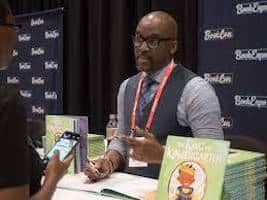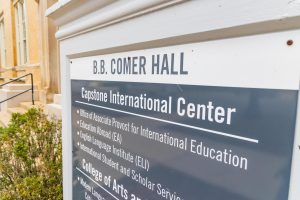Opinion | Baseless fears of critical race theory lead to real discrimination

Derrick Barnes at BookExpo Convention in 2019.
February 12, 2023
Hoover City public schools planned on honoring Black History Month this February by inviting award-winning Black author Derrick Barnes to visit three of their elementary schools. But come January, the school district inexplicably canceled the visits, pinning the blame on Barnes’s failure to provide information for the contract; some even said Barnes had canceled the visit himself.
Both claims, however, were untrue.
In reality, Barnes’s visits were canceled after a parent complained about his supposedly “controversial” ideas and social media presence. The Kansas City-based author’s award-winning children’s books typically feature Black children; to view the “outrage” and cancellation as a direct product of racism and discrimination is no leap.
The irony of conservatives blocking the employment and free speech of someone like Barnes while constantly clamoring about the unfairness of “cancel culture” with regards to the expulsion of public bigots from private platforms, like anti-semite Kanye West and transphobe Jordan Peterson, should not be lost on you.
The reality is that the door for this type of discrimination has been opened by cultural and legislative backlash by white Alabamians towards critical race theory, an ideology which promotes accuracy in education about America’s historical treatment of people of color.
In an absolute feat of misrepresentation, fearmongering and backwards logic, conservative talking heads have convinced their audiences that this anti-discriminatory measure is actually racism against white people.
Put aside the fact that whiteness itself is a social construct created to define who is normal, acceptable and privileged by society: critical race theory explicitly promotes truth and accuracy — its proponents and adherents aim to include and provide representation for historically oppressed communities, there is nothing about that which excludes or disadvantages white students.
But sure, let us even give into the ridiculous argument that critical race theory is somehow problematic. Even with that concession, how does one justify the cancellation of Barnes’s school visits? Barnes’s books are not bibles of critical race theory, they are children’s books which reflect the life experiences of children of color; what on earth could be problematic about that if you do not think that Black representation and inclusion is a problem in and of itself?
Barne’s books cover the beauty behind natural Black hair and hairstyles in “Crown: An Ode to the Fresh Cut” and intentionally aim to empower young Black voices in “I Am Every Good Thing.”
The hideous truth is that racism is still very much alive in contemporary Alabama, and it merely veils itself behind dog whistles like attacks on critical race theory and distortions of diversity, equity and inclusion as “controversy.”
In some ways, this modern era of racism is even more dangerous and nefarious than it has been in the past, as one must wade through layers of nuance, misinformation and talking points to get to the heart of the bigotry.
Nonetheless, we must not be discouraged, we must not cower away when presented with intentional frustrations and thickheadedness, we must continue to fight racism as vigorously as those heroes whom we honor during this special month. Cast light where bigots would breed shadows and refuse to be bogged down by the ever-intensifying ridiculousness of regressive rhetoric.
We Americans are better than this. We Alabamians are better than this. If we truly wish to cast off the stereotypes long-associated with our state, and our nation at-large, then we must actually commit ourselves to progress and see boldface racism for what it is, not hide behind false ignorance.
For a more intricate, compelling and evidenced explanation of how American racism has evolved over time and persists to this day, I strongly encourage reading Charles Mills’s “The Racial Contract.”




















